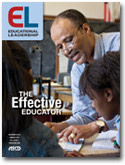In Moneyball: The Art of Winning an Unfair Game (Norton, 2003), Michael Lewis relates how Billy Beane, general manager of the Oakland Athletics, helped his small-payroll baseball team compete against teams with deeper pockets. Beane knew intuitively that many commonly used baseball metrics, such as batting average and the tools that scouts look for (arm strength, speed, a good swing, and so on), didn't accurately predict a player's value to his team. By identifying a new set of metrics—including players' internal "makeup" and their ability to draw walks—Beane was able to field a team of overlooked players who didn't fit the regular major league superstar mold but who were every bit as good as the big-money stars.
What does this have to do with teachers? Perhaps a great deal. Like many major league teams, schools may be overlooking some important metrics or even using the wrong measures as they strive to recruit and retain the best teachers.
What Matters More
Research suggests that good teachers possess a few simple, quantifiable attributes.
Verbal and cognitive ability. Given that teachers spend most of the day thinking on their feet and communicating with students, it's not surprising that teachers' verbal and cognitive abilities are strongly tied to their success in the classroom. For example, Ferguson and Ladd's (1996) analysis of the achievement of nearly 30,000 Alabama 4th graders found that teachers' ACT scores exerted a larger influence on student achievement than did student poverty level, class size, and teaching experience combined.
Adequate knowledge of their content areas. Debates have raged over how important it is for teachers to be experts in their subject areas. Rice (2003), who has reviewed hundreds of studies of teacher quality, notes that "subject matter knowledge contributes to good teaching only up to a certain point, beyond which it does not seem to have an impact" (p. 37). Good teachers must know their subjects well, but having doctoral-level knowledge of Freudian interpretations of Victorian literature, for example, doesn't really improve someone's ability to teach language arts to 8th graders.
Knowledge of how to teach their subject areas. Recently, a team of German researchers addressed the debate about what matters more—teachers' knowledge of subject matter or their knowledge of how to teach it (often calledpedagogical content knowledge). Baumert and colleagues (2010) tested 194 high school mathematics teachers on both their math skills and their knowledge of how to teach difficult math concepts. They found that although content knowledge is essential, teachers who also possess strong pedagogical content knowledge are more effective than those with content knowledge alone. Students in the study whose teachers had strong pedagogical content knowledge (ranking among the top one-fifth of teachers) were likely to gain a full year more learning than students whose teachers had weak pedagogical content knowledge (among the bottom one-fifth of teachers).
What Matters Less
Research has also found that many common metrics for hiring and rewarding teachers are only weakly linked to student success.
Traditional licensure or credentials. After comparing achievement data for more than 3,000 high school students with their teachers' certification, Goldhaber and Brewer (2000) found "little rigorous evidence that [teacher certification] is systematically related to student achievement" (p. 141). One partial exception may be National Board certification. An extensive analysis of North Carolina data found higher achievement in classrooms of National Board–certified teachers. Yet the study detected no before-and-after effects—that is, teachers appeared no more effective after undergoing the grueling certification process than before it (Clotfelter, Ladd, & Vigdor, 2007).
Advanced degrees. In her survey of research, Rice (2003) found that several studies conducted since the 1970s "have found no discernible effect of teachers having a master's degree or higher on student achievement" (p. 26). Indeed, some studies, including the North Carolina analysis mentioned earlier, found slightly negative correlations with teachers' advanced degrees and student achievement (Clotfelter et al., 2007). One possible exception appears to be high school science and mathematics, where teachers with subject-specific master's degrees are more effective than those without such degrees (Goldhaber & Brewer, 1998).
Extensive classroom experience. After comparing teacher characteristics to achievement results for more than 1.3 million Texas students, a team of economists found that first-year teachers "and to a lesser extent second- and third-year teachers" were less effective than more experienced teachers (Rivkin, Hanushek, & Kain, 2005, p. 447). However, they found little difference in teacher effectiveness after about five years of experience. Certainly, many teachers improve their skills throughout their careers. Yet on average, after a few years of teaching, added years of teaching experience appear to offer little guarantee of increased effectiveness.
The Intangibles
The attributes discussed to this point can be measured or quantified quite easily. Savvy principals, however, know that great teachers also possess many intangible attributes. Here are a few intangibles that research links to teacher effectiveness.
Belief that all students can learn. Since the famous Rosenthal experiment in the late 1960s, the Pygmalion effect—the observation that teachers' expectations for their students affect how well students learn—has been well documented (Hattie, 2009).
Belief in their own abilities. A RAND study conducted more than 30 years ago (Armor et al., 1976) found links between student achievement and teachers' sense of efficacy—their belief in not just their students' ability to succeed, but also their own ability as teachers to help those students succeed.
Ability to connect with students. Cornelius-White (2007) conducted a meta-analysis of research on teacher-student relationships and found that teachers' warmth, empathy, and "nondirectivity" strongly correlated to higher levels of student participation, motivation, and achievement.
Advice for Educators
Few teacher candidates are likely to display all of these attributes when they first walk through the classroom door. School leaders must consider, then, which attributes they can augment and which they cannot. They may also need to reexamine the metrics, explicit or implicit, they use to select and compensate teachers. Being credentialed, being experienced, or holding an advanced degree is no guarantee of effectiveness. Leaders must look more deeply, examining whether teachers have adequate knowledge of their subjects and know how to teach them. At the same time, important intangibles, such as a teacher's dispositions and attitudes, although more difficult to glean from a résumé, can still be teased out through interviews and observations of teachers delivering sample lessons.
A Lesson from the Major Leagues
Any analogy comparing baseball players to teachers has its flaws. Baseball is, of course, just a game; in the grand scheme of things, it matters little who wins or loses. For students, though, the quality of their teachers can be the difference between academic success and failure. Schools would do well to put as much careful analysis into selecting their teachers as major league teams put into scouting and drafting their players.






